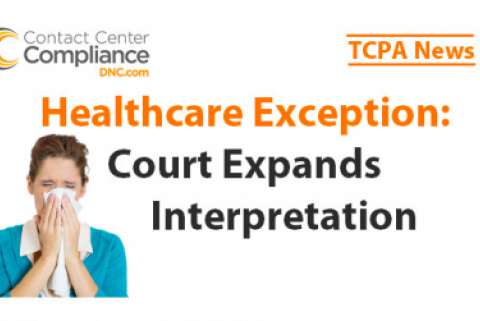The Healthcare Exception to the TCPA had its day in court this month. In their decision, the U.S. Court of Appeals for the Second Circuit issued a broad interpretation for automated calls delivering healthcare messages. This TCPA lawsuit involves a hospital texting flu shot reminders to past patients. What makes this case different from similar lawsuits is that the plaintiff had not previously received a flu shot, but had visited one of the hospitals in the system several years earlier.
In 2003, Daniel Latner went to one of the hospitals in the Mount Sinai Health System for a routine exam. One of the forms he completed prior to his examination included permission for the facility to use his health information for the purpose of “payment, treatment and hospital operations.”
Years later, the hospital contracted with a third party to send automated text messages to patients on its’ behalf. Those calls included reminder messages to schedule a flu shot appointment. Mr. Latner received one such text in 2014 which read:
“Its flu season again. Your PCP at WPMG is thinking of you! Please call us at 212-247-8100 to schedule an appointment for a flu shot.”
The Lawsuit
What happened next is a familiar story. Mr. Latner sued the hospital under the Telephone Consumer Protection Act (TCPA) which “makes it unlawful to send texts or place calls to cellphones through automated telephone dialing systems, except under certain exceptions or with consent.”
On appeal, the court addressed the two issues central to deciding the lawsuit.
- Does the Healthcare Exception apply to the flu shot reminder message sent to him on behalf of the hospital?
- Did Mr. Latner provide the hospital with his prior consent to receive text messages?
First, the court looked at the Healthcare Exception to the TCPA. The intent of the exception created by the FCC was to recognize that automated healthcare messages educate patients and promote adherence to treatment plans. The 2012 Health Care Exception creates an exemption from the TCPA requirement of having written consent before initiating calls to cellphones. It allowed “calls to wireless cell numbers if the call ‘delivers a ‘health care’ message made by, or on behalf of, a ‘covered entity’ or its ‘business associate,’ as those are defined in the HIPPA Privacy Rule.”
The Court determined that the flu shot reminder text message sent to Mr. Latner fell within the Healthcare Exception to the TCPA and did not require “prior written consent”.
"Considering the circumstances, we hold that Latner provided his prior express consent to receiving a single text message about a 'health-related benefit' that might have been of interest to him." – Jose A. Cabranes, Circuit Judge
The court then ruled that Mr. Latner had granted prior “expressed consent” when he provided his cellphone number at the time of his first visit to the Mount Sinai hospital. By signing the hospital’s consent form, he had given permission for them to share his information for treatment purposes.
The decision is favorable to healthcare providers who use text messaging to provide treatment and flu shot reminders. This is also an instance where the court approached a TCPA lawsuit with an opened mind and made a decision that reinforced the spirit of the law.





